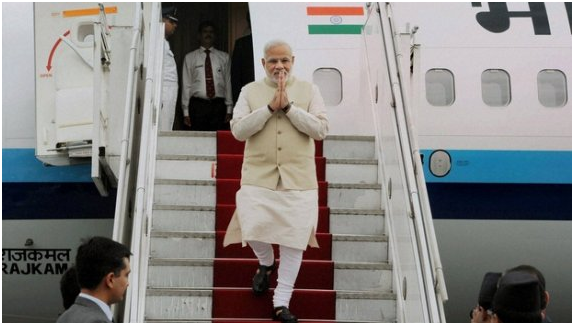How Much Have The PM's Visits Abroad Cost India? Missions Remain 'Secretive'
Prime Minister Narendra Modi

NEW DELHI: Prime Minister Narendra Modi’s first burst of foreign visits---20 countries from Bhutan till Bangladesh---cost the exchequer a minimum of Rs 40 crores according to responses received from about 15 countries to Right to Information requests and persistent appeals by a retired naval officer Commodore Lokesh Batra. The figure does not include the cost of chartered aircraft, and other expenditure not incurred directly by the missions.
The justification of the visits comes from the diplomatic impact on bilateral relations, economic agreements signed, and the spin off both diplomatically and financially that should follow. In other words, a Prime Ministerial visit is not a lark as it costs the nation a pretty penny.
Commodore Batra spent weeks writing under the RTI Act to the heads of mission of the concerned countries asking for the “total expenditure incurred by the public authority,” a “breakup of the total expenditure” and “if any of the event is sponsored or funded by organisation(s) other than Indian missions” concerned with the PM’s visit.” The responses, as he told The Citizen, tricked in and in several cases he had to go in appeal to force the mission to part with the information. In some cases---such as Japan, Sri Lanka, France, Washington DC ----the missions have flatly refused to part with the information so far.
Commodore Batra was aghast at some of the responses where the missions maintained that they had not collated the information. And about the amount of time and petitioning it took to get them to respond to his letters for the above information. As he has pointed out in many of the appeals he sent back to the missions that Section 4(1) of the RT Act, 2005 mandates: “Every public authority shall-a) maintain all its records duly catalogued and indexed in a manner and the form which facilitates the right to information under this Act and ensure that all records that are appropriate to be computerised are, within a reasonable time and subject to availability of resources, computerised and connected through a network all over the country on different systems so that access to such records is facilitated.”
Clearly there is a division amongst the missions insofar as the grounds of appeal are concerned. Fifteen complied with the request made under the RTI Act, the others insisted otherwise and have not complied with the request till date. This despite a Supreme Court ruling that “the right to information is a cherished right” and that “the provisions of the RTI Act should be enforced strictly and efforts should be made to bring to light the necessary information under clause(b) of section 4(1) of the Act which relates to securing transparency and accountability in the working of public authorities and in discouraging corruption.”
As Commodore Batra said, “for me it is all about transparency. Why are some of these missions being so secretive.” He pointed to an earlier order whereby such expenditure should be placed on the website “proactively.” Except in cases to do with ‘national security’ which clearly was not the case in diplomatic visits/ He said he is now trying to find out the cost incurred during the PMs visits on chartered aircraft saying that this in itself will run into crores. And as the Commodore pointed out, if the payments have not been cleared it is certainly one of the reasons why national carriers like Air India are in the red.
Australia is one of the missions that has given a detailed response, with meticulous break up of the expenditure incurred. Interestingly Commodore Batra also approached the New York consulate for the details about the Madison Garden event addressed by PM Modi. He was informed by the Consulate that the “community reception” for the PM was “organised by the Indian community of USA.” And hence it obviously could not give details of the expenditure incurred, but said that it had incurred an expenditure of Rs 305700 “on behalf of Prasar Bharati.”
While the New York Consulate gave the details of the PM’s visit as asked for, the Indian embassy in Washington refused to part with the information maintaining that “the information sought is not readily available with the concerned authority in the Embassy.” To the appeal by the Commodore pointing out that the information should have been “proactively” put up on the website the mission maintained “this Public Authority has shared information mandated under the RTI Act and GOI orders in the public domain” and played with words on all other points raised by him to deny the information.



